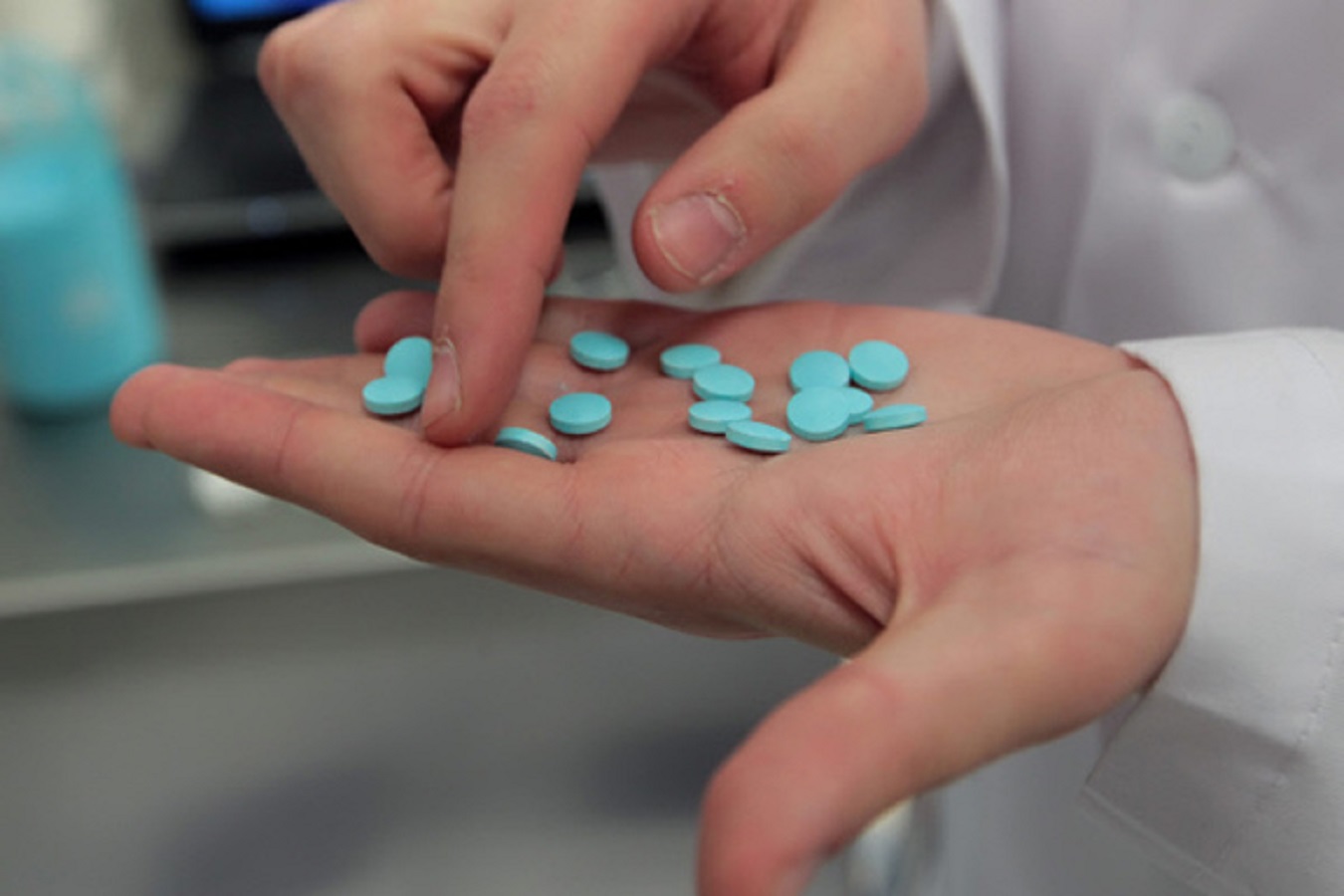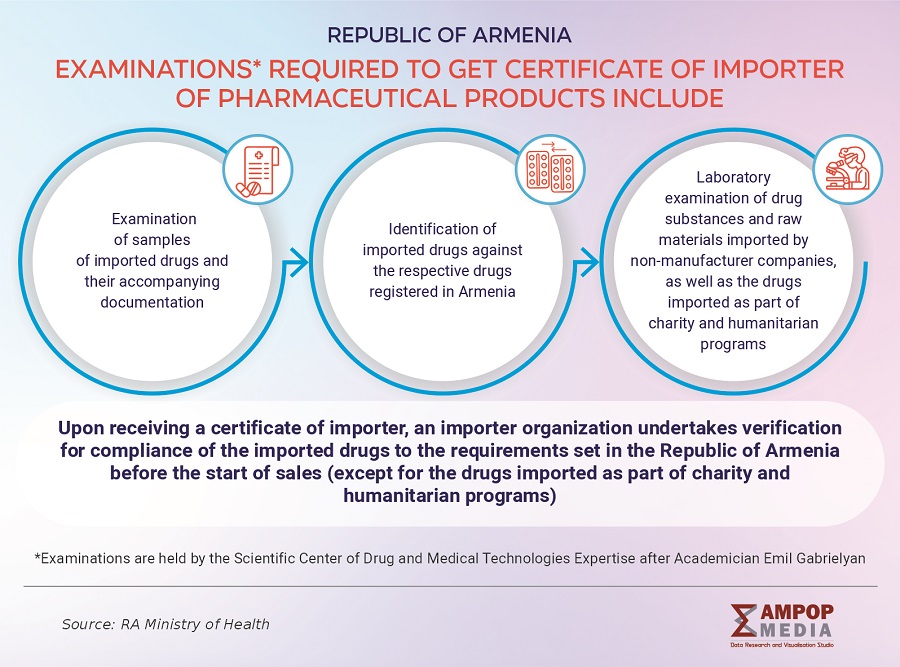Armenia is the only country in the world, where the packaging of medicines is opened at pharmacies to make buying only a certain number of the pills possible, says expert Hovhannes Martirosyan. “Opening packaging of drugs is forbidden elsewhere. How come it has been made possible in Armenia?! The reason is that majority of people cannot afford buying a whole package. Why? Because the prices are too high,” the expert said in a conversation with Ampop Media.
Martirosyan says with proper policies the prices of medications in Armenia can be reduced by 40%, to make them affordable enough for the people to buy them in closed packaging and help pharmacies avoid going against a major regulation of the sphere to never open a package before sale.
Hovhannes Martirosyan is a pharmacist and holds a PhD degree in biology. In 1992-1998, Martirosyan has been the first head of the Licensing Department of the Scientific Center of Drug and Medical Technology Expertise, and has worked in the healthcare system till 2005.
Opening a pharmaceutical company in Moscow in 2015, Martirosyan had decided to import drugs to Armenia at prices that he said would be lower than the market prices. For that he was planning to operate “Vita pharm”, a company that would help him organize the imports. Yet, it never proved to be an easy endeavor. The company’s attempts to import some 10 types drugs were rejected by the Center for Drug Expertise on a wide range of grounds. Martirosyan recalls cough syrups manufactured by a Hungarian pharmaceutical company “Egis” were imported to Armenia in those days.
“Egis” was registered in Armenia as the company that manufactured the type of syrups, yet, in the status of an open joint stock company, whereas according to its documents the company was in fact a closed joint stock company, something that was indicated clearly on the packaging of the batches imported by “Vita pharm”. And since the change was not registered in the drug database in Armenia, the Center for Drug Expertise had concluded the importer was not registered in Armenia.
“We were told the status of the company would be updated once the right holder company that had registered the medication in Armenia applied for that, so that the drug we imported would be classified as registered. I did make attempts to reach to the right holder, but was told the application would be submitted when the right holder wished so. Of course, the right holder delayed the updating procedures until the batch it had imported was sold. That’s why the syrups we had imported from Russia planning to market at prices 40 to 50 percent lower, were prohibited by the state, pointing to a requirement of the law,” Martirosyan recalls.
It looks like for a permission to import in parallel a certain type of drug, the pharmaceutical products that are intended for import and those registered in the database have to totally coincide.
To obtain a permit for parallel import the drug to be imported shall be fully identical to the one registered. The Law on Drugs says all the batches of the drug shall be recalled from the market shall the insert slip of the product submitted by the registered drug right holder has the slightest difference from the registered version or the packaging of the imported drug, even when the difference refers to the design, an issue that is beyond the competence of the Drug Agency.
Meanwhile, the parallel imports of drugs are allowed globally, in case the registered and the imported drugs differ in a way as to not question their safety and efficacy.
The routes to import pharmaceutical products are blocked by legislation
The registration in the state database of drugs is a precondition for the import of medication to Armenia. According to the law regulating the drugs only the right holder of the drugs is authorized to import to Armenia. And the right holder is the entity that registers the drug at the Drug Agency. Martirosyan says this clause of the law blocks any option to import drugs to the country and monopolizes imports.
Vahe Varsanyan, the head of the “Vaga Pharm” company, one of Armenia’s largest importers of drugs, shares Martirosyan’s position; according to the legislation regulating the circulation of drugs a lion’s share of imports belongs to the right holders, whereas importing through supplier companies is practically unfeasible.
Varsanyan says the legislation is devised to protect the interests of the registration right holders, forcing other companies to import drugs from them.
“So, as a matter of fact, the right to import the lion’s share of the drugs belongs to the right holders of drug registration. The legislation bans importing the same drug from other markets, specifically, the EU and the EAEU. The legislation was designed by the experts of the drug agency, and in a way that best meets their own interests,” Vahe Varsanyan says.
Varsanyan believes, in a situation where there is lack of competition, and the right to import and sell drugs belongs solely to its right holders, the latter the ones who set the prices in the market.
Prices on drugs dropped during the coronavirus pandemic and the 44-day war; what made it possible?
In 2020, the prices on certain drugs dropped amid the pandemic and the war. Those were mostly drugs that were not registered in the country, and there was a certain degree of shortage of their equivalents against the rising demands.
Registration of drugs is a time consuming endeavor that implies a wide range of procedures, which means entering local markets for much needed drugs may be a long process. The import of non-registered pharmaceutical products to Armenia was permitted by a government decision, something that was a favorable move for those importers, who were not right holders. The purpose was to ensure the population was provided with the needed medicines.
Drug importers say the pharmaceutics market won from the situation as the market got decentralized, the prices dropped dramatically, while their range grew.
Vahe Varsanyan, the head of the “Vaga Pharm”, thinks the decision allowed for vitally important non-registered drugs reach Armenia, as there were no alternatives to them in the country by that time. He says the market prices dropped tangibly, as the import of vital drugs from EU and the EAEU was permitted.
Varsanyan underlines there is no reason to question the quality and the safety of non-registered drugs. Those are mostly drugs that have been registered in Russia and the European Union and meet international standards. “There are many drugs in Russia that are vital, for which the state enforces low prices. We benefit from that at importing those vital drugs to Armenia. There are also drugs that have dropped in price by 5 or 6 times. And there are EU member states that are poor and get subsidized, and so we benefit from importing drugs from those countries at lower prices, too,” he explains.
Varsanyan adds around 700 types of drugs had become more affordable in Armenia owing to the competition that was formed in the market during two years. However, permission to import non-registered pharmaceutical products expired on 31 December 2021. The government says extending the permission was unnecessary out of the fears the market could be hard to control.
The Ministry of Health justifies the decision by the concerns that unregistered drugs of questionable quality could be imported to the country and the process could become uncontrollable. Vahe Varsanyan argues the position by pointing that no case of unsafe drug imports had been registered and no problems had been identified while the imports were allowed.
“Furthermore, the permission hit the black market of pharmaceutics. Before, there were numerous cases when the drugs that were in short supply were imported in violation of customs requirements overriding the perspective of criminal investigation. The drugs were marketed at much higher prices. The prices on the black market had dropped significantly, while the permission was still in effect,” Varsanyan recalls.
The Ministry of Health confirmed to Ampop Media that no cases were registered on non-registered drug quality or safety in Armenia in 2020-2022.
Varsanyan says the permission to import non-registered drugs parallel to right holders let small and new companies to enter the market. The prices of drugs dropped in the result of decentralization and the competition that was shaped in the market.
Ampop Media requested the State Revenues Committee to provide a list of drug importing companies in Armenia. The statistics shows a dramatic growth of the number of importers in 2020, and a proportionate drop following the January 2022.
Experts and heads of drug importer companies share the opinion that Armenia has once again found itself at the starting point of 2020. There is less competition now, which explains the rise of prices on drugs.
The importers suggest extending the permission to import vitally important unregistered drugs to at least the end of 2025 to avoid collapse in the sphere.
Starting 1 January 2026 the drugs in the territory of the EAEU will have to be undergone the registration and procedures compliant to the rules of the union. That will let import drugs that will be officially registered in the territory of the EAEU.
The Scientific Center of Drug and Medical Technologies Expertise after Academician Emil Gabrielyan responded to Ampop Media’s request to comment on the decision to suspend the permit of the parallel imports of non-registered drugs to Armenia. Anna Tsaghikyan, the head of the Center’s Department for the Control of Imports and Exports of Drugs says the very wording vitally important is not correct from the agency’s perspective.
“I respond to letters regarding postal delivery of drugs, which are not registered in Armenia on a daily basis. Judging from those letters, those vital drugs, which were not registered and were not imported during those two years, were not imported following the decision, either. The gaps regarding the treatment of some health conditions that have existed before have remained unsolved to this day.”
Commenting on the legislative gap pointed by both the experts and the importers to give the right of imports solely to right holders who register the drug, Vardanyan said: “Any legislation may have gaps; the center is open to every suggestion, but we have not received any reasonable offer from any economic entity so far that could be worth submitting to an authorized body.”
Expert Hovhannes Martirosyan believes the pharmaceutics market has been controlled by medical representatives rather than the Ministry of Health or the drug control agency for the last 30 years. “They have serious leverages in their hands and are the ones to actually decide which drug to register in Armenia and what type of decision to make. They are the ones to define policies. And they do that guided by their own corporate interests rather than Armenia’s interests. An elderly patient with a health condition complains of high prices on drugs and blames importers, who earn millions, while the elderly remain unable to buy the needed drugs. Yet, the importers are fully dependent on the medical representations operating in Armenia”.
P.S. According to information spread by the Ministry of Health on 3 October Minister Anahit Avanesyan has recently met with the heads of manufacturer and importer companies to discuss the processes of supplying and registering drugs, as well as issues related to the provision of vitally important medications. At the meeting, the minister has also reflected on the issues regarding the manufacturing and registration of drugs in EAEU markets. A number of options have been discussed to prevent the potential obstacles that may occur at importing drugs to Armenia, taken the current geopolitical situation.
Written by Lilit Hovhannisyan
Infographics by Anush Baghdasaryan
More articles about #AccesstoHealthCare
© All the stories, infographics and other visuals bearing the Ampop Media logo is possible to publish on other audiovisual platforms only in case of an agreement reached with Ampop Media and/or JFF.
Փորձագետի կարծիք
First Published: 28/11/2022











